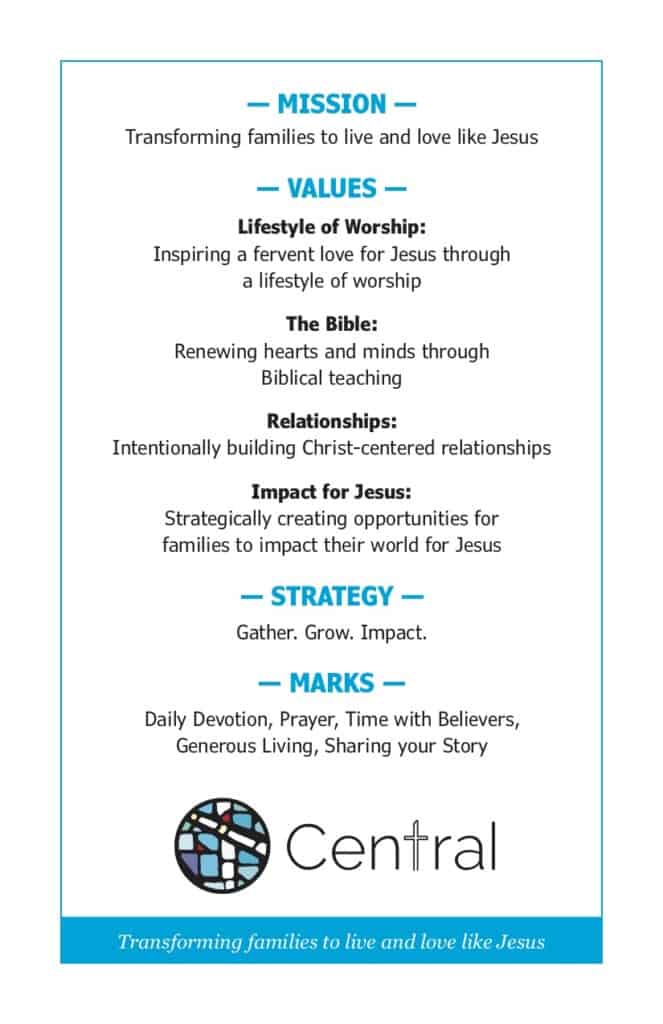Four years ago, our staff huddled up in the Senior Pastor’s office to answer one question: What are the marks of a disciple? The person leading the meeting drew a figurine on the board then gave the team time to collaborate about their answers. Around the table that day were numerous college and seminary-trained professionals. Surely this exercise would be a home run! All we had to do was describe a disciple, but sadly, we couldn’t.
In the end, “Mr. Stick Man” (as I like to call him) was covered head to toe in a plethora of random and disconnected words. The poor guy would have drowned in ink if he were actually alive. To this day, I still don’t remember a single word written on the board. The options were so varied, and the approaches so diverse, that no one even attempted to unite the different ideas. It was an impossible task. The person leading the meeting did his best, but unfortunately we just weren’t ready.
I realized in that moment that our people probably felt the same way. They were either overwhelmed by our assorted description of what a growing disciple looked like and were therefore drowning, or they were completely tuned-out because it was just too complicated.
Are We Missing the Mark?
That meeting forced me to ask an even bigger question, a question that every church should ask. If making more and better disciples is truly the mission, then how are we doing? I’m convinced that one of the reasons discipleship is neglected in churches today is because we have grossly overcomplicated the process. According to Thom Rainer:
Churches with a simple process for reaching and maturing people are expanding the kingdom … Conversely, churches without a process or with a complicated process for making disciples are floundering. As a whole, cluttered and complex churches are not alive. (Will Mancini. Church Unique: How Missional Leaders Cast Vision, Capture Culture, and Create Movement. p. 136).
George Barna lists three reasons that churches are unsuccessful at making disciples today (George Barna. Growing True Disciples: New Strategies for Producing Genuine Followers of Christ. pp. 74-76):
- Few churches or Christians have a clear and measurable definition of spiritual success.
- We have defined discipleship as “head knowledge ” rather than complete transformation.
- We have chosen to teach people in random, rather than systematic, ways.
I think that this partially describes our predicament at Central. Although we are seeing great success in salvations, baptisms, and new people coming to church, we are not experiencing exponential growth. Last year, 116 people accepted Jesus, 70 were baptized, and close to 600 new visitors attended our services, but today we remain the same. Why is that?
The more I pray and research, the more I am convinced that our problem is systematic. We have the right players and the right mission. We even have solid values and a well-defined strategy. The only piece missing is the target. What are we aiming at? What is a win?
The New Scorecard
If we really want to hit the mark, then it is time to create a new scorecard—a scorecard that counts spiritual growth. The old scorecard is based on a bricks-and-mortar mentality that narrows down the win to a specific time and place occurrence. It measures bucks and butts. Although these measurements are helpful, they don’t answer the ultimate question: Are people becoming more like Jesus?
What follows may seem anticlimactic, but I assure you that it isn’t. The scorecard is simple. Below are five marks of a mature, growing disciple. The question we must ask is: Are these marks present in our peoples’ lives, and are they, in turn, developing these marks in the lives of others?
1. Daily Devotion
The importance of daily time in the Word can hardly be overstated. As theologians like to point out, right doctrine inspires right living. God’s primary way of speaking to hearts and minds is through His inerrant Word. If we have a true longing to see the world the way God does, then naturally we will long for His guiding voice in our lives.
Submitting to the Word as our guiding light is where discipleship begins. Even Jesus’ own perspective of the world was rooted and grounded in Scripture. He was so dependent upon the Word of God that He equated it to the body’s daily need for food. He believed that, “Man should not live by bread alone, but by every word that comes from the mouth of God” (Matt. 4:4).
This leads to a simple question: Do our people view the world through the lens of Scripture? The first mark of a growing disciple is daily devotion.
2. Prayer
If time in the Word is where we hear from God, then time in prayer is where God hears from us. According to the Lord’s Prayer (Matt. 6:9-13), praying like Jesus involves at least six things:
- Praying that God would be first—“Hallowed be Your name.”
- Praying that God would use us in kingdom work—“Your kingdom come”
- Praying for the faith to trust God’s will—“Your will be done.”
- Praying for God’s daily provision—“Give us our daily bread.”
- Praying for forgiveness—“Forgive us our debts.”
- Praying for strength to live righteously—“Lead us not into temptation.”
Do our people pray like Jesus? What kind of impact does their prayer life have on their everyday life? As John Piper says: “There aren’t any victories in the Christian life without prayer” (desiringgod.com, Sermon on The Lord’s Prayer).
3. Time with Believers
Discipleship can only happen in the context of community. As God’s image bearers, we have been created for authentic, life-giving community. Meaningful community can happen to some extent in weekend gatherings, but the intimacy needed for effective discipleship can never be sustained at a weekend service. This is why it is vitally important to have genuine relationships outside of Sunday church. Furthermore, discipleship is not you, your Bible and a cup of coffee; it requires time with other believers. This is where small groups are particularly helpful.
So, are our people spending time with each other outside of Sunday? If this mark is missing, then spiritual growth will likely be slow or maybe even non-existent.
4. Generous Living
One of the sure signs of a growing disciple is radical generosity. When I say generosity, don’t think solely of money—think bigger! What does it look like for people to be generous with their time, treasure and talent? What does it look like to leverage every resource for the kingdom of God? In the New Testament we see that generous disciples seize every opportunity to make a kingdom impact. They do it by giving financially, serving sacrificially, praying fervently, and, above all, by investing in what will last forever. There are lots of ways to be generous.
The good news is that Jesus Himself gave us an example of generous living by entering into our world for the sake of sinful mankind: “For you know the grace of our Lord Jesus Christ, that though He was rich, yet for your sake He became poor, so that you by His poverty might become rich” (2 Cor. 8:9). The question to ask is: Are our people marked by sacrificial generosity? Which kingdom are they living for? For where your treasure is, there your heart will be also.
5. Sharing Your Story
The last mark is a call to evangelism. It is a call to share what Christ has done in you with the world around you. Our call to reach the lost is a reminder that Jesus’ invitation extends beyond our own transformation to the transformation of others. When Jesus called His first disciples, He said, “Follow me, and I will make you fishers of men” (Matt. 4:19). Reaching others with the gospel is a central part of our identity as disciples.
The good news is that evangelism is for all people. According to 1 Peter 2:9, we have been saved to “proclaim the excellencies of Him who called us out of darkness into His marvelous light.” If this is true, then why do so few people do it? There are many reasons this mark is neglected, but the most prominent is attached to a subtle lie. The lie is that evangelism is only for professionals. No lie has hurt the proclamation of the gospel more than this one. It is Satan’s greatest tool for keeping Christians silent about their faith.
The best way to cultivate a heart for evangelism is to encourage believers to reach their own relational world with the gospel. Making an impact doesn’t need to be a special mission reserved for a special occasion (i.e. a missions trip). God wants to use us in our workplace, at our schools, with our family, in the neighborhood, and with our circle of friends. We don’t need to have it all together to be used by Him—we just need to be willing. A willing spirit and a heart of love can accomplish more for the kingdom of God than all the ministry degrees in the world.
If a person feels they have nothing profound to share, then all they need to do is remember their story. Every believer has a story—a story of how once they were dead, but now they are alive. Our story is the best evangelism tool in our tool belt. Like the woman at the well, all we have to do is go back and tell our village what Jesus did and He will take care of the rest. So, are our people sharing their stories?
In summary, the five marks of a growing disciple are Daily Devotion, Prayer, Time with Believers, Generous Living, and Sharing your Story. This is the new scorecard.
Becoming Disciple-Makers
In order to ignite this vision for discipleship, we need to do better at reminding the average, everyday believer that they are part of the solution. Actually, they aren’t just part of the solution, they are the solution! Making disciples is as easy as instructing believers to bring others along with them in their spiritual journey. If they have the marks of a disciple, then they are fully capable of making disciples. This means that discipleship is more about intentionality than technique. It involves teaching others to read the Bible the way you do, to pray the way you do, and to tell people about Jesus the way you do. J.D. Greear says, “If you have Christian habits in your life worth imitating, you can be a disciple-maker. It doesn’t require years of training. You just teach others to follow Christ as you follow Him.” (J.D. Greear. Gaining By Losing. p. 137).
Discipleship, therefore, is all about intentionality. It happens when two or more people intentionally spur one another on to a better image of Christ in all areas of life. It is a cooperative effort between a believer, their relational network, and God. Through the discipleship process the Holy Spirit empowers believers to put off the old life and put on the new as they choose daily to take up their cross and follow Jesus. When everyone is engaged in this process, the church stops growing by addition and begins to grow by multiplication.
So, how about you? Is your church hitting the mark? If you brought your staff into a room and asked them to identify the marks of a disciple, how varied would their answers be? Maybe it’s time for you, too, to formalize this piece of your strategy. No more shooting in the dark. No more missing the mark. It’s time to change the scorecard.
Pictured is an example of how the five marks fit into the vision and strategy of Central Christian Church in Lancaster, California.












